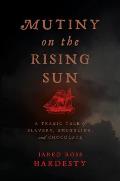Thompson on Hardesty, Mutiny on the Rising Sun
Last month the H-Early-America list shared Mark L. Thompson’s review of Mutiny on the Rising Sun: A Tragic Tale of Slavery, Smuggling, and Chocolate by Jared Ross Hardesty.
Here’s a taste:
Hardesty and his team, with the support of Old North, have brought that “lurid past” back into the light. To be sure, knowing more about Edward Jackson means his name is no longer attached to a church shop selling candy to tourists and school groups, but that seems like a Good Thing.
Thompson’s full review can be downloaded here.
Here’s a taste:
…Hardesty draws on this Dutch and Atlantic research but offers something new: a microhistorical account of a single smuggling venture and the wide cast of characters who were involved in and touched by it. If most contraband trade was a prosaic affair that attracted little notice, this ill-starred voyage from Barbados to Suriname in 1743 proved in several respects to be quite the opposite, as it led to murder trials, official investigations, gory printed accounts, and transcontinental legal wrangling.I think that last sentence could easily be read as suggesting Old North “scrubbed away…Jackson’s lurid past.” The bloody story of this voyage was scrubbed away centuries ago; Boston historians didn’t know about it.
Working from the long paper trail that followed in the Rising Sun’s bloody wake, Hardesty and a team of researchers in New England and the Netherlands (in particular, Ramona Negrón, a doctoral candidate in history at Leiden University) have been able to trace out the story in many directions through extensive archival research. The result is a detailed account that weaves together multiple historical threads into a well-constructed narrative.
Although the book calls itself a tragedy, it borrows its form (and appearance) from true crime with a splash of gothic horror. The dust jacket is printed in muddy black and brown tones with blood-red accents (while the cloth cover beneath is bright red with golden print along the spine). True to form, the introduction begins with an apparently placid but foreboding scene—the Rising Sun’s boatswain steering the ship on a calm June night—but by the third page the captain, supercargo, and clerk have been stabbed about twenty times, chopped with an axe, sliced with a cutlass, and, in the case of the captain, thrown overboard, “scream[ing] as he plunged into the dark abyss”. . . .
The epilogue, meanwhile, offers a fascinating account of the origins of the book, which began as an earnest effort to learn more about the namesake of “Captain Jackson’s Historic Chocolate Shop,” a tourist attraction and heritage site associated with the Old North Church along the Freedom Trail in Boston. In a strange turn of events, the research for the book (sponsored in part by the candy company Mars Wrigley Confectionary) actually led to the shutting down of the chocolate shop. . . . Today the eighteenth-century Clough House that once marketed historic chocolate is home to a colonial-style print shop and an artisanal gift store. Captain Jackson’s lurid past has been well scrubbed away.
Hardesty and his team, with the support of Old North, have brought that “lurid past” back into the light. To be sure, knowing more about Edward Jackson means his name is no longer attached to a church shop selling candy to tourists and school groups, but that seems like a Good Thing.
Thompson’s full review can be downloaded here.


No comments:
Post a Comment